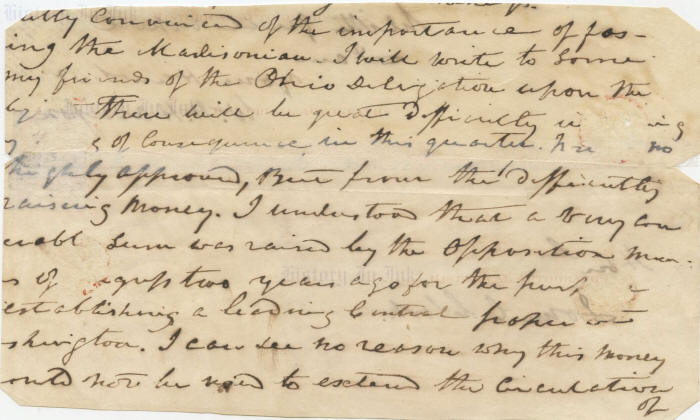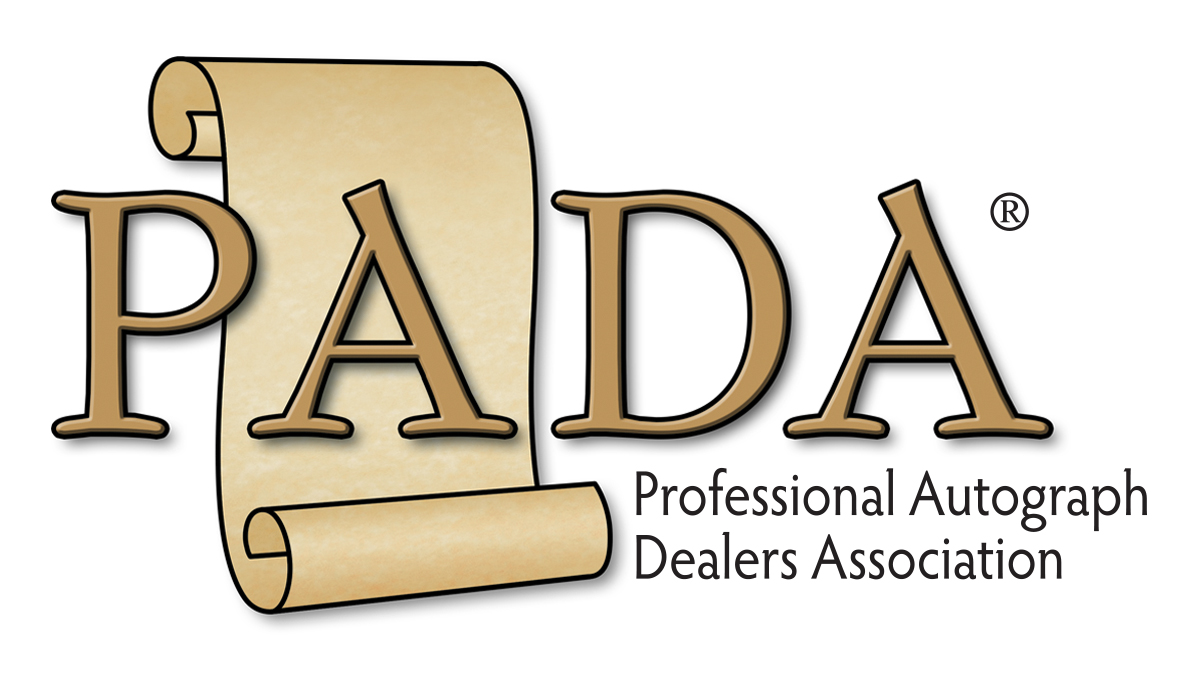2306201
William Henry Harrison
Scroll down to see images of the item below the description
Harrison suggests funding to spread the circulation of a friendly newspaper,
which some of his supporters in Congress abused their franking privilege to mail free
William Henry Harrison, 1773–1841. 9th President of the United States, 1841. Partial autograph letter signed, W. H. Harrison, two pages (front and back), 4” x 6½”, no date [circa 1840], no place.
This piece shows Harrison’s behind-the-scenes maneuvering to aid his own 1840 presidential campaign. Harrison writes to Congressman John C. Clark, evidently regarding the promotion of and funding for a newspaper, The Madisonian, which was friendly to the Whigs. The newspaper spawned controversy because congressional Whigs were abusing their franking privilege by mailing it free in support of Harrison.
With portions of words added in brackets to clarify missing pieces of words from this partial letter, Harrison writes:
[f]ully convinced of the importance of fos-
[ter]ing the Madisonian. I will write to some
[of] my friends of the Ohio delegation upon the
[su]bject. There will be great difficulty in . . .
. . . of consequence in this quarter. . . .
highly approved, but from the difficulty
raising money. I understand that a very con
[sid]erabl[e] sum was raised by the opposition mem-
[ber]s of [Con]gress two years ago for the purp[os]e
[of] establishing a leading central paper at
[Wa]shington. I can see no reason why this money
[sh]ould not be used to extend the circulation of
With great respect
I am
Your huml Servt
W. H. Harrison
Hon Sir
John C. Clark
John Chamberlain Clark (1793–1852) was a Whig and one of Harrision’s supporters and operatives in Congress. Harrison seems to be suggesting to him that the money in question should be used “to extend the circulation” of the Madisonian in order to counter opposition newspaper publicity.
As it turned out, some Whig members of Congress were misusing their franking privilege illegally to mail political pieces, including copies of the Madisonian, in support of Harrison’s candidacy. A report in The Extra Globe dated October 5, 1840, discusses abuse of the franking privilege by congressional Whigs. It describes a letter from the postmaster at Eaton, New York, dated March 24, 1840, stating that his office had received a package franked by Hugh A. Garland, who was Clerk of the House of Representatives, that contained “ten copies of the Life and Public Services of William H. Harrison, seven letters of John C. Clark to the Whigs and Conservatives of Chenango and elsewhere, [and] seven newspapers called the Madisonian,” and stating that the postmaster believed “that arrangements are made to send large quantities of the Madisonian and political tracts to his and other offices under the frank of members of Congress.”
Clark was a four-term United States Representative from New York who served 1827–1829 and 1837–1843. Originally a Democrat, Clark became a Whig in 1837 because he favored continuation of the Second Bank of the United States over the independent Treasury that President Martin Van Buren and the Democrats favored. He was reelected to Congress as a Whig in 1838 and 1840.
Harrison almost certainly wrote this letter during the 1840 campaign, which he would win. He had the longest inaugural address of any President and the shortest administration. He died on April 4, 1841, just 31 days after his inauguration on March 4. He was the first President to die in office.
This is a nice example of Harrison’s holograph with a bold and attractive signature. Harrison has written and signed in dark brown ink. The piece has four small circular spots where abrasion from removal of the red wax seal, outlines of which are present, affected a bit of the text, as shown by the ellipses in the quotation above. There is skillful archival reinforcement along a horizontal fold separation that affects but does not obscure two lines of the text. One flattened vertical fold, which is intact, is almost invisible. Because part of the letter is missing, the strict grading standards of The Manuscript Society say that the piece is in poor condition, but the portion of the letter that is present is much better, in fair to good condition.
Unframed.








